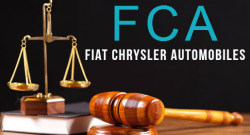
— Fiat Chrysler has been taking a beating lately and it looks like people are still swinging at the automaker.
A Pennsylvania law firm has announced it's investigating Chrysler for a possible lawsuit over violations of the Securities Exchange Act of 1934. The investigation is being conducted on behalf of investors in Fiat Chrysler vehicles after the automaker admitted it failed to properly conduct recalls.
In less than five weeks, Fiat Chrysler has faced a public hearing conducted by the U.S. government, a $105 million fine from the National Highway Traffic Safety Administration, the very public hacking of a Jeep Cherokee, a recall of 1.4 million vehicles to protect them from hackers and a lawsuit that was filed after the Jeep was hacked.
All of that negative attention allegedly caused Fiat Chrysler shares to fall by 5 percent to close on July 27, 2015 at $14.41 per share.
The investigation concerns alleged violations of the Securities Exchange Act of 1934 and whether Chrysler made misleading statements to investors regarding safety recalls.
If you purchased Fiat Chrysler shares and would like more information, contact the Law Offices of Howard G. Smith.
GM Shareholder Lawsuit Tossed
Lawsuits filed by auto manufacturer shareholders aren't unheard of and a recent case concerning General Motors is a good example.
Following the disaster of GM's failure to recall cars with deadly and defective ignition switches, investors filed suit against the company's board of directors. The lawsuit alleged the board should have been aware of the risks GM created by selling vehicles with the defective switches.
However, a Delaware judge put an end to the shareholder lawsuit by ruling the investors “failed to raise a reasonable doubt that GM’s directors acted in good faith or otherwise face a substantial likelihood of personal liability in connection with the faulty ignition switches.”




